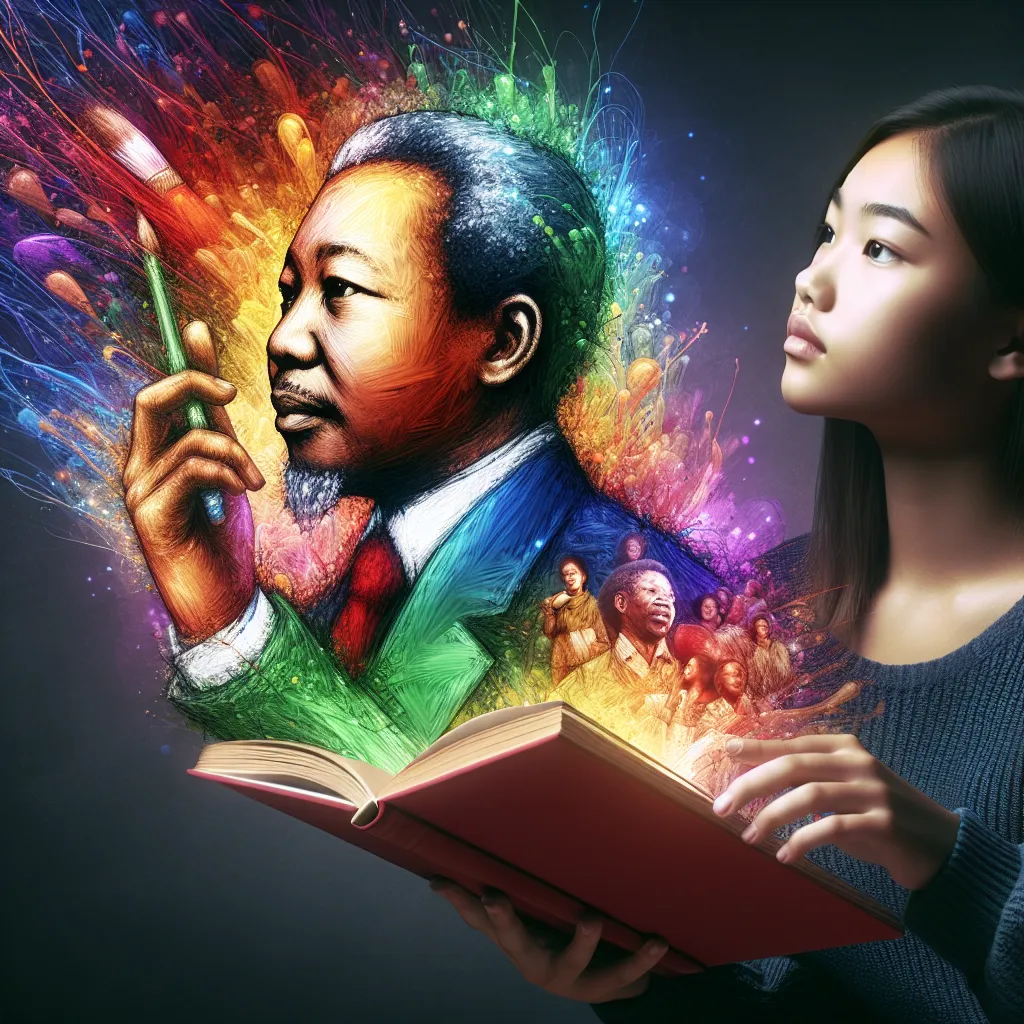As an experienced IELTS Speaking examiner, I’ll guide you through answering questions about an inspiring historical figure. This topic is common in IELTS Speaking tests and likely to appear in future exams. Let’s explore how to tackle this subject effectively to achieve a high band score.
Nội dung bài viết
- Part 1: Introduction and Interview
- Question: Do you enjoy learning about history?
- Part 2: Long Turn
- Cue Card:
- Follow-up questions:
- Part 3: Two-way Discussion
- Question: How do you think the way we remember historical figures has changed with the advent of the internet and social media?
- Key Vocabulary and Phrases for High Scores
- Examiner’s Advice
Part 1: Introduction and Interview
In Part 1, the examiner may ask general questions about history or influential people. Here’s a sample question with a suggested answer:
Question: Do you enjoy learning about history?
Band 6-7 Answer:
Yes, I find history quite interesting. I especially enjoy learning about important events and people from the past. It helps me understand how our world has changed over time.
Band 8-9 Answer:
Absolutely, I’m fascinated by history. I find it incredibly enriching to delve into the stories of past civilizations and influential figures. It not only provides context for our present but also offers valuable lessons we can apply to our lives today.
Part 2: Long Turn
Here’s a cue card related to describing a famous historical figure:
Cue Card:
Describe a famous historical figure who inspires you.
You should say:
- Who this person is
- What they are famous for
- When you first learned about them
- And explain why this person inspires you
Band 6-7 Answer:
I’d like to talk about Nelson Mandela, a famous South African leader. He’s well-known for fighting against apartheid in South Africa and becoming the country’s first Black president. I first learned about him in school when we studied modern history.
Mandela inspires me because he showed great courage and determination. He spent 27 years in prison for his beliefs but didn’t give up. After his release, he worked to unite his country instead of seeking revenge. His ability to forgive and focus on reconciliation is truly admirable.
What I find most inspiring about Mandela is his commitment to equality and justice. He fought for what he believed in, even when it was difficult. His life teaches us about the power of perseverance and the importance of standing up for our rights.
Band 8-9 Answer:
I’d like to discuss Nelson Mandela, an iconic figure in the fight against apartheid in South Africa. Mandela is renowned for his unwavering commitment to racial equality and his instrumental role in dismantling the apartheid system. He later became South Africa’s first Black president, symbolizing the country’s transition to democracy.
I first encountered Mandela’s story during my high school years, and I was immediately captivated by his extraordinary journey. What struck me most was his remarkable resilience in the face of adversity. Despite enduring 27 years of imprisonment, Mandela emerged not bitter, but determined to foster reconciliation and build a united South Africa.
Mandela profoundly inspires me for several reasons. Firstly, his unyielding dedication to his principles, even in the face of severe personal cost, is truly awe-inspiring. His willingness to sacrifice his freedom for the greater good demonstrates unparalleled courage and conviction.
Moreover, Mandela’s capacity for forgiveness and his focus on national unity rather than retribution showcase an exceptional level of emotional intelligence and leadership. His approach to conflict resolution and nation-building serves as a powerful model for addressing deeply rooted societal issues.
Lastly, Mandela’s life epitomizes the transformative power of perseverance and hope. His journey from prisoner to president vividly illustrates that positive change, no matter how daunting it may seem, is achievable through persistence and unwavering belief in one’s cause.
Follow-up questions:
- How did learning about this historical figure change your perspective on life?
Band 6-7 Answer:
Learning about Mandela changed how I see challenges in life. It made me realize that we can overcome big obstacles if we don’t give up. His story also taught me the importance of forgiveness and working together with others.
Band 8-9 Answer:
Studying Mandela’s life has profoundly impacted my worldview. It has instilled in me a deeper appreciation for the power of resilience and the importance of maintaining one’s principles in the face of adversity. Moreover, it has broadened my perspective on conflict resolution, highlighting the transformative potential of forgiveness and reconciliation in both personal and societal contexts.
- Do you think it’s important for young people to learn about historical figures? Why or why not?
Band 6-7 Answer:
Yes, I think it’s very important. Learning about historical figures helps young people understand the past better. It can also inspire them to make positive changes in their own lives and communities. These stories show that one person can make a big difference in the world.
Band 8-9 Answer:
I firmly believe that it’s crucial for young people to study historical figures. Such knowledge provides invaluable insights into the forces that have shaped our world and offers powerful examples of human potential. By examining the lives of influential individuals, young people can gain perspective on long-term social change and develop critical thinking skills. Furthermore, these historical narratives can serve as sources of inspiration, encouraging youth to aspire to greatness and work towards positive societal change.
 Inspiring Historical Figure
Inspiring Historical Figure
Part 3: Two-way Discussion
Question: How do you think the way we remember historical figures has changed with the advent of the internet and social media?
Band 6-7 Answer:
I think the internet and social media have changed how we remember historical figures a lot. Now, we can easily find information about them online anytime. Social media also helps spread stories about these people quickly. This means more people can learn about historical figures, but it also means we need to be careful about fake information.
Band 8-9 Answer:
The advent of the internet and social media has dramatically transformed our approach to remembering and interpreting historical figures. On one hand, these technologies have democratized access to historical information, making it possible for anyone with an internet connection to delve into the lives of significant individuals from the past. This unprecedented accessibility has broadened our collective understanding and sparked renewed interest in historical narratives.
However, this shift also presents notable challenges. The rapid dissemination of information through social media can sometimes lead to the oversimplification of complex historical figures and events. There’s a risk of reducing nuanced legacies to easily digestible sound bites or memes, potentially distorting our perception of their true impact and character.
Moreover, the internet’s nature allows for the proliferation of both accurate information and misinformation. This necessitates a heightened level of critical thinking and media literacy among users to discern credible sources from unreliable ones.
On a positive note, social media platforms have facilitated engaging discussions about historical figures, often bringing to light lesser-known aspects of their lives or reexamining their legacies through modern lenses. This ongoing dialogue can lead to a more comprehensive and nuanced understanding of historical figures and their contributions.
In essence, while digital technologies have revolutionized our access to historical information, they also require us to be more discerning and analytical in our approach to remembering and interpreting the lives of significant figures from the past.
Key Vocabulary and Phrases for High Scores
-
Iconic figure /aɪˈkɒnɪk ˈfɪɡə(r)/ (noun phrase): A very famous person who represents a particular idea or quality.
Example: Martin Luther King Jr. is an iconic figure in the civil rights movement. -
Unwavering commitment /ʌnˈweɪvərɪŋ kəˈmɪtmənt/ (noun phrase): A strong and steady dedication to a cause or principle.
Example: Her unwavering commitment to environmental conservation inspired many to join the cause. -
Epitomize /ɪˈpɪtəmaɪz/ (verb): To be a perfect example of something.
Example: Gandhi’s life epitomizes the power of non-violent resistance. -
Profound impact /prəˈfaʊnd ˈɪmpækt/ (noun phrase): A very significant or deep effect.
Example: Reading about historical leaders had a profound impact on her career choices. -
Transformative power /trænsˈfɔːmətɪv ˈpaʊə(r)/ (noun phrase): The ability to cause a major change.
Example: Education has a transformative power in society. -
Instill /ɪnˈstɪl/ (verb): To gradually but firmly establish an idea or attitude in a person’s mind.
Example: Good teachers instill a love of learning in their students.
Examiner’s Advice
To excel in the IELTS Speaking test when describing a historical figure:
-
Prepare diverse examples: Research various historical figures from different fields and eras to have a range of options.
-
Practice articulating your thoughts: Regularly explain why a historical figure inspires you, focusing on clear and coherent expression.
-
Develop your vocabulary: Learn and use sophisticated terms related to history, leadership, and personal qualities.
-
Link to personal experiences: Connect the historical figure’s qualities or actions to your own life or aspirations.
-
Consider different perspectives: Be prepared to discuss both positive and potentially controversial aspects of historical figures.
Remember, the key to a high score is not just what you say, but how you express it. Aim for fluency, a wide range of vocabulary, and the ability to discuss the topic from various angles.


